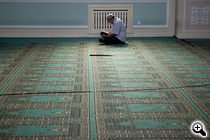 Following two deadly explosions in Kazakhstan, investigators and officials remain tight-lipped over their probes, only insistently ruling out terrorism. Many, however, are finding the hazy explanations hard to swallow, and the press is rife with speculation about the rise of Islamic radicalism.
Following two deadly explosions in Kazakhstan, investigators and officials remain tight-lipped over their probes, only insistently ruling out terrorism. Many, however, are finding the hazy explanations hard to swallow, and the press is rife with speculation about the rise of Islamic radicalism.
The explosions, which are yet to be fully explained, occurred last month in strategic cities in different parts of the country and both appeared to target facilities run by the National Security Committee (KNB), Kazakhstan's powerful intelligence arm. The first blast – and the first suicide bomb ever reported in Kazakhstan, which has virtually no tradition of radical Islam – occurred at the KNB headquarters in the western oil city of Aktobe on May 17, when 25-year-old Rakhimzhan Makatov rushed into the building and blew himself up, killing himself and injuring two others. The attack bore the hallmarks of an extremist suicide bombing, but investigators offered a different explanation: Makatov was a criminal kingpin who blew himself up "with the aim of avoiding responsibility" for alleged crimes, prosecutor's office spokesman Zhandos Umiraliyev said.
The Kazakh media has treated that line skeptically. "Someone give an Oscar to the author of this gem!" commented the Delovaya Nedelya weekly sarcastically on May 27. On June 6 Kazakh news website Guljan carried an investigative report from Aktobe which concluded that Makatov had been radicalized in a part of Kazakhstan analysts identify as a potential breeding ground for extremism.
Though the energy-rich west boasts the country's highest average salaries, social inequality is also high, commentators say. This contributes to disaffection highlighted in the strikes and labor protests in another western oil city, Aktau, this May and June.
Reports that some residents of western Kazakhstan have been found waging jihad in the Russian Caucasus have fueled suggestions of radicalization. In July 2009 five fighters from town of Zhanaozen were killed in a shootout with Russian security forces in Dagestan; last October a Kazakh national from Aktau suffered the same fate. In 2009 Kazakh law enforcers identified a domestic terror threat, and six Aktobe Region residents were sentenced to 12-17 years in prison for planning terrorist attacks on oil facilities.
The Guljan report concluded that Kazakhstan has become a terror target. It accused officials of being unwilling to "look the truth in the eye," because this would damage its "reputation as the only island of stability in a surrounding sea of terrorism." This suggests a marked difference with some other Central Asian states, which are frequently accused of inflating the threat of Islamic radicalism to bolster Western support.
Astana prizes its image as a bastion of stability in a volatile region, illustrated in comments by Prime Minister Karim Masimov at the Astana opening of the World Islamic Economic Forum on June 7. "In this region Kazakhstan is the only country that lives in stability," he said, putting this down to the respect Kazakhstan – where approximately 70 percent of the population is Muslim – has for different faiths.
Masimov was speaking two weeks after another blast. Early on May 24 a car exploded outside an Astana remand center run by the KNB, killing the driver and a passenger. The driver was identified as Dmitriy Kelpler, a resident of the northern town of Ekibastuz in Pavlodar Region; the passenger as a Pavlodar Region resident with a criminal record (officials have not released the name).
Some observers pointed out that the explosion did not bear the hallmarks of a suicide bombing – it happened at night, avoiding civilian casualties – and officials immediately ruled out links to terrorism. Investigators remain taciturn on both probes, however. "The investigations are continuing," an Interior Ministry spokesperson told EurasiaNet.org. "There is no further information for now."
A Taliban warning issued to Kazakhstan days before the Astana explosion has fed conspiracy theories. In an Internet statement, the Taliban urged the government to reconsider its "wrong policy" of agreeing to send a contingent of four specialists to NATO's headquarters in Afghanistan and warned of "negative consequences."
Following the threat some media outlets railed against the decision, which Astana emphasizes involves sending not front-line troops but specialists to assist reconstruction. It "is nothing but a political step, setting us alongside the main targets of international terrorism," Delovaya Nedelya protested. Administration officials are not inclined to see a link between the explosions and the Taliban statement.
It is "premature to talk of terrorism until the investigation and courts have delivered a final verdict," Foreign Minister Yerzhan Kazykhanov told the Liter daily on May 28. "Kazakhstan has always been and remains a generator of stability and security."
But some community leaders are warning that Kazakhstan needs to do more to tackle potential breeding grounds for extremism.
"The state is trying to avoid a problem that has come to a head," Murat Telibekov, president of the Union of Muslims of Kazakhstan (a non-governmental organization independent of the state-backed Spiritual Board of Muslims of Kazakhstan, the country's supreme authority on Islam), told a recent round table at Almaty's Institute of Political Solutions (IPS) think-tank, which took place before the explosions.
Speaking after they occurred in remarks quoted by the Guljan website, Telibekov urged Kazakhstan's Islamic clergy to modernize as part of efforts to tackle extremism. "An effective vaccination is needed against religious obscurantism, fanaticism, and extremism," he concluded.
Editor's note: Joanna Lillis is a freelance writer who specializes in Central Asia.
EurasiaNet.org




